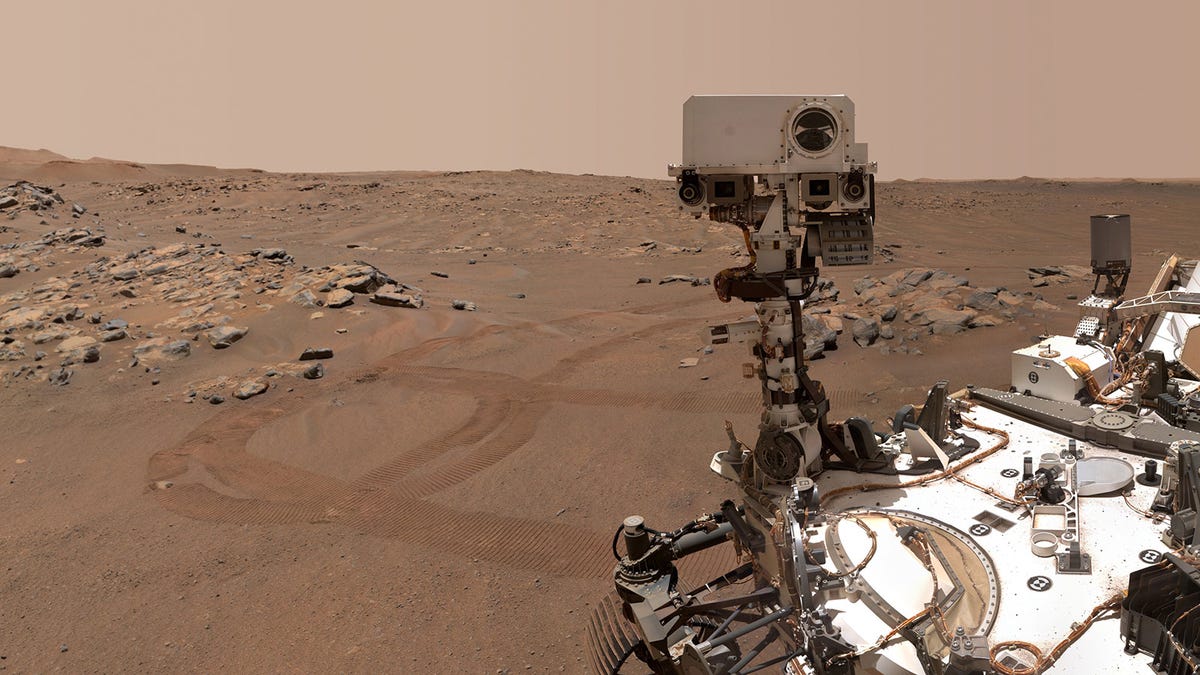

Використовуючи мікрофон, лазер і інноваційну математику, команда вчених виміряла швидкість звуку на Марсі, що стало першим науковим і ще одним чудовим відкриттям, зробленим марсоходом NASA Perseverance.
У місії стійкості можна багато чого полюбити, але одним з моїх улюблених аспектів марсохода є те, що він може записувати аудіо. На початку минулого року вперше ми могли почути на Марсі звуки, як природні, так і штучні. використовуючи файл SuperCam Мікрофонмандрівний зареєстровані Марські вітри дмуть, клацання Від лазерів, що сканують каміння, і звуків скреготу, які видають їхні прядки.
Наполегливість мікрофона, який розпізнає ці звуки, не була певною, Дивлячись на болісно тонку атмосферу на червоній планеті. Для поширення звуку потрібен середовище, а на Марсі атмосферний тиск невеликий 0,095 фунта на квадратний дюйм (psi) На рівні землі це не так багато для роботи. Для порівняння, атмосферний тиск на рівні моря Землі становить близько 14,7 фунтів на квадратний дюйм.
Але вони були тамНепомітний шум Підхоплено мікрофоном Персі в кратері Джезеро. З голосами, чітко чутими на Марсі, Баптіст Шейн з Лос-Аламосської національної лабораторії в Лос-Анджелесі та однолітки вона була Здатний виміряти швидкість звуку на Марсі. Нещодавно введені вчені висновки В 53-я планетарна і місячна наукова конференціяякий проходив 7-11 березня в Техасі.
The команда кран Експеримент Perseverance Experiment від SuperCam, який підриває скелі за допомогою лазера для вивчення геології Марса та Він розташований у голові щогли зонда на висоті 6,9 футів (2,1 м) над поверхнею Марса. Команда виміряла 150 лазерних знімків, зроблених у п’яти різних місцях, а також відстежувала місцеві погодні умови.
G/O Media може отримати комісію

Up to $1,500 off
Samsung Neo QLED TV 4K (2021)
Quantum Matrix Technology
Experience this brilliantly intense picture powered by a vast array of tiny light cells using exclusive Mini LED designed technology for hyper-focused brightness and dimming in all the right areas.
By measuring the time it took the staccato-like clicking sounds to reach the SuperCam microphone, they were able to establish the speed of sound on Mars, to a precision of plus-minus 0.51%. They found that sound on Mars travels at 787 feet per second (240 meters per second), which is significantly slower than the sound of speed on Earth at 1,115 feet per second (340 m/s).
And in an observation that matched prior predictions, the speed of sounds below 240 hertz fell to 754 feet per second (230 m/s). That doesn’t happen on Earth, as sounds within the audible bandwidth (20 Hz to 20 kHz) travel at a constant speed. The “Mars idiosyncrasy,” as the scientists call it, has to do with the “unique properties of the carbon dioxide molecules at low pressure,” which makes the Martian atmosphere the only one in the solar system to experience “a change in speed of sound right in the middle of the audible bandwidth,” as the scientists wrote. The reason for this is that sounds above 240 Hz don’t have time to relax their energy, according to the scientists.
The scientists go on to say that this acoustic effect “may induce a unique listening experience on Mars with an early arrival of high-pitched sounds compared to bass.”
Unique is right! Lots of acoustic information exists below 240 Hz, including the low end of music and the lowermost registers of the human voice (typically for males). Music on Mars would sound completely messed up (particularly with increased distance), with the middle and high frequencies reaching the listener slightly before the low frequency sounds, such as the lower registers of the bass guitar and kick drum. Add another effect of carbon dioxide, the attenuating, or dampening, of higher frequencies, and the acoustic experience gets even weirder.
As a neat aside, the technique used to measure the speed of sound can also be used to measure the local temperature. So in addition to Percy’s Аналітик динаміки середовища Марса (MEDA), команда має в своєму розпорядженні новий термометр. Забігаючи наперед, Чіде та його колеги проведуть більше тестів для вимірювання швидкості звуку в різний час доби та в різні марсіанські сезони.

“Професійний вирішувач проблем. Тонко чарівний любитель бекону. Геймер. Завзятий алкогольний ботанік. Музичний трейлер”






